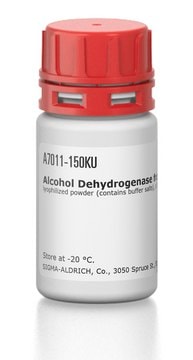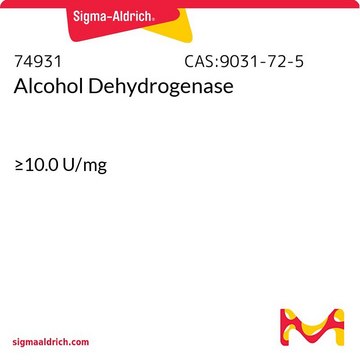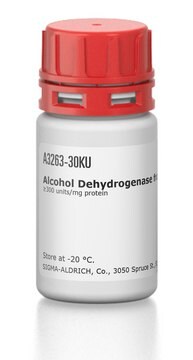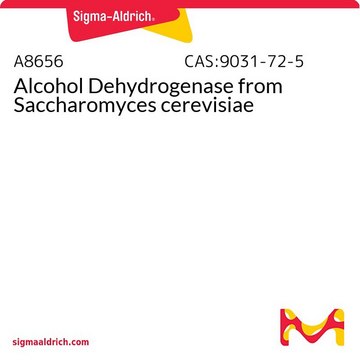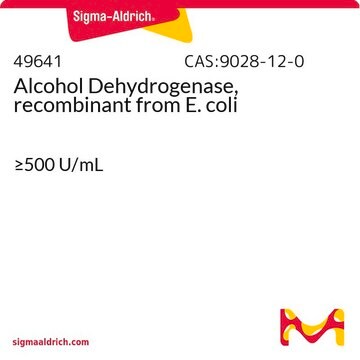Alle Fotos(1)
Wichtige Dokumente
55689
Alkoholdehydrogenase equine
recombinant, expressed in E. coli, ≥0.5 U/mg
Synonym(e):
ADH
Anmeldenzur Ansicht organisationsspezifischer und vertraglich vereinbarter Preise
Alle Fotos(1)
About This Item
Empfohlene Produkte
Biologische Quelle
equine
Qualitätsniveau
Rekombinant
expressed in E. coli
Beschreibung
Isozyme E sequence
Form
lyophilized powder
Spezifische Aktivität
≥0.5 U/mg
Farbe
white
light yellow
pH-Wert
7
Löslichkeit
water: 5 mg/mL
Anwendung(en)
life science and biopharma
Lagertemp.
−20°C
Angaben zum Gen
equine ... ADH1(111772995)
Suchen Sie nach ähnlichen Produkten? Aufrufen Leitfaden zum Produktvergleich
Allgemeine Beschreibung
Research Area: Neuroscience
Alcohol dehydrogenase is a zinc metalloprotein that forms five classes of isoenzymes through the dimerization of eight different subunits.
Alcohol dehydrogenase is a zinc metalloprotein that forms five classes of isoenzymes through the dimerization of eight different subunits.
Anwendung
Alcohol Dehydrogenase equine has been used in in vitro alcohol dehydrogenase (Adh) assay.
Biochem./physiol. Wirkung
Alcohol dehydrogenase catalyzes the oxidative conversion of alcohol into aldehyde. It has a homodimeric structure with a co-enzyme binding domain at the C-terminal and an N-terminal catalytic domain. The active site is located at the interdomain cleft. Binding of NAD+ in the active site causes conformational changes which create the binding site for the alcohol substrate.
Horse liver alcohol dehydrogenase (HL-ADH) is an enzyme with broad specificity, capable of catalyzing the reversible oxidation of a wide variety of primary and secondary alcohols to form their corresponding aldehydes and ketones. Moreover, alcohol dehydrogenase can oxidize ethanol while simultaneously reducing nicotinamide adenine dinucleotide (NAD+) to NADH. Previous studies have demonstrated that ADH and ALDH variants can influence alcohol dependence. Additionally, the ADH genotype has been linked to lacunar infarction and neuropsychiatric diseases.
Einheitendefinition
1 U corresponds to the amount of enzyme which reduces 1 μmol benzaldehyde per minute at pH 7.0 and 30 °C.
Signalwort
Danger
H-Sätze
P-Sätze
Gefahreneinstufungen
Resp. Sens. 1
Lagerklassenschlüssel
11 - Combustible Solids
WGK
WGK 1
Flammpunkt (°F)
Not applicable
Flammpunkt (°C)
Not applicable
Hier finden Sie alle aktuellen Versionen:
Besitzen Sie dieses Produkt bereits?
In der Dokumentenbibliothek finden Sie die Dokumentation zu den Produkten, die Sie kürzlich erworben haben.
Ioanna A Gorbunova et al.
The journal of physical chemistry. B, 125(34), 9692-9707 (2021-08-20)
The dynamics of polarized fluorescence in NADH in alcohol dehydrogenase (ADH) in buffer solution has been studied using the TCSPC spectroscopy. A global fit procedure was used for determination of the fluorescence parameters from experiment. The interpretation of the results
Steven Hayward et al.
Biophysical journal, 91(5), 1823-1831 (2006-05-23)
Horse liver alcohol dehydrogenase is a homodimer, the protomer having a coenzyme-binding domain and a catalytic domain. Using all available x-ray structures and 50 ns of molecular dynamics simulations, we investigated the mechanism of NAD+-induced domain closure. When the well-known
Structure of a triclinic ternary complex of horse liver alcohol dehydrogenase at 2.9 A resolution.
H Eklund et al.
Journal of molecular biology, 146(4), 561-587 (1981-03-15)
F Colonna-Cesari et al.
The Journal of biological chemistry, 261(32), 15273-15280 (1986-11-15)
A study of the hinge bending mode in the enzyme liver alcohol dehydrogenase is made by use of empirical energy functions. The enzyme is a dimer, with each monomer composed of a coenzyme binding domain and a catalytic domain with
H Eklund et al.
Biochemistry, 23(25), 5982-5996 (1984-12-04)
The binding of NAD to liver alcohol dehydrogenase has been studied in four different ternary complexes by using crystallographic methods. These complexes crystallize isomorphously in a triclinic crystal form which contains the whole dimer of the enzyme in the asymmetric
Unser Team von Wissenschaftlern verfügt über Erfahrung in allen Forschungsbereichen einschließlich Life Science, Materialwissenschaften, chemischer Synthese, Chromatographie, Analytik und vielen mehr..
Setzen Sie sich mit dem technischen Dienst in Verbindung.